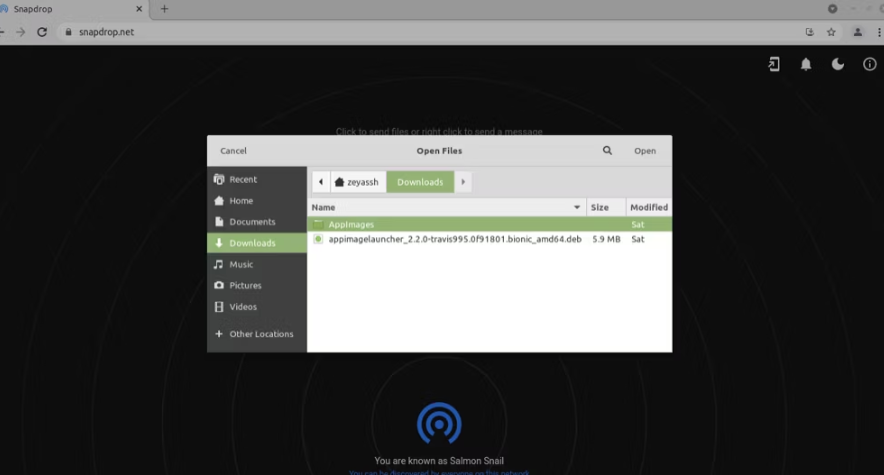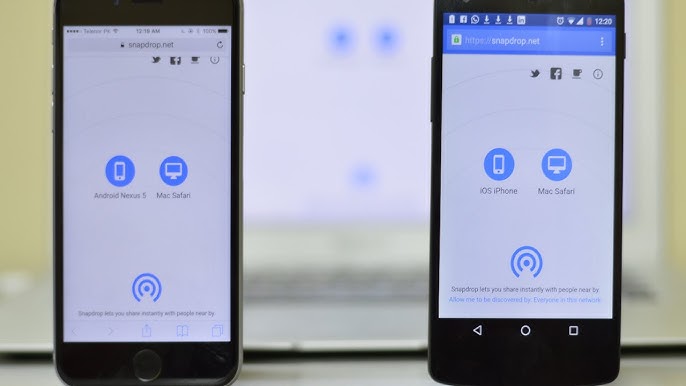Sending big files for collaboration or personal use is possible using Snapdrop, a well-known peer-to-peer and open-source file transfer tool that is totally free. We have created this comprehensive guide to help all of you who are unsure about how to use Snapdrop. We understand your confusion.
One of the simplest and most dependable ways to share links, videos, PDFs, and pictures with anyone in your vicinity is via Snapdrop. Our step-by-step guide will walk you through the entire procedure from beginning to end, making it even easier and teaching you how to utilize Snapdrop.
Transfer Files Between Linux, Android, and iOS
Using a WebRTC-based browser is the only prerequisite for using Snapdrop. Furthermore, you are free to select any of these browsers because nearly all of the popular ones available today—Chrome, Brave, Edge, Firefox, etc.—use WebRTC.
In this tutorial, we’ll use Google Chrome to show you how to transfer files between Linux, Android, and iOS devices. Use whichever browser you like.
You don’t have to use identical browsers for the two browsers you’re attempting to transfer files between.
Share Files From Linux to Android or iOS
Make sure that both the Android and iOS devices are connected to the same network before sharing files from a Linux computer to one of them.
Next, go to the Snapdrop website on your computer by opening the online browser. Take your Android or iOS device and repeat the same method.
Snapdrop should show your PC and Android/iOS device as visible to each other if they are connected to the same Wi-Fi network. Next to the, You are known as a label, your discovery name will appear. Snapdrop will display on the screen if there are several devices connected to your network that are viewing it.
Here are the procedures to transfer files from your PC to your Android or iPhone:
- To transfer files to a device, click on it.
- Your computer’s file explorer will then open thanks to Snapdrop. To access the directory holding the files you wish to transfer, use it.

- Click OK or Open after selecting the files to share.
- Alternatively, to save yourself a few extra steps, you can open the file manager and browser side by side and drag and drop files from the file manager right onto the receiving device.
- Next, to save the received files, press the Save button on your receiving (Android/iOS) device when the File Received window appears. To deny, select Ignore.
- Remove the check mark next to “Ask to save each file before downloading” to let Snapdrop download and save incoming files automatically, saving you the trouble of doing it yourself.
- On your file system, all of the files you receive are saved, and you may view them with your default file manager on Android devices or the Files app on iPhones.
Transfer Files From Android/iOS to Linux
Moving files from your Linux PC to an Android or iOS device and vice versa is also rather simple.
Make sure everyone is using the same network on both devices in order to accomplish this. Next, go to the Snapdrop website using your preferred web browser on each of your Linux computers, Android/iOS devices, and Linux PCs individually.
Both of these devices should be able to see each other once you’re on Snapdrop. To use Snapdrop to send files to your Linux computer, follow the instructions below, based on the model of your smartphone.
On Android
- Select Files (or your preferred file manager) by clicking on the name of the Linux system in Snapdrop.
- Select OK after selecting the files you wish to share.
On iPhone
- To access the Files app, tap the name of the Linux system in Snapdrop and choose Browse.
- Navigate to the folder where you wish to share files, pick the files you want to share, and then press Open.
- As an alternative, you can Select Photo Library from the menu and select the pictures you wish to share.
- You will now see a pop-up box asking if you wish to preserve the received files when you go back to your Linux machine. Click Save to save them to your computer. To prevent the transfer, you can also tap Ignore.
- To download received files to your computer automatically, disable the option to “Ask to save each file before downloading,” as was previously described.
Snapdrop Options You Might Want to Explore

Snapdrop has a few more choices to enhance usability and user experience, despite its minimalist design and functionality.
These are some of the settings and options that you can modify:
1. Send a Message
This function, as its name implies, lets you message another device via Snapdrop. It can be useful if you want to make sure the correct individual is sharing files with Snapdrop before you allow many people on your network to access it.
When composing a message to a fellow Linux Snapdrop user, simply right-click on their name, type your message in the Send a Message window, and click SEND.
From an Android or iPhone device, tap and hold the device you wish to send a message to until the Send a Message option appears. In this window, type your content, then click SEND.
2. Enable Notifications
With Snapdrop, you can set up on-site notifications to receive notifications whenever someone messages you or shares a file.
3. Turn On Dark Mode
The Moon icon in the top-right corner of the screen allows you to switch between bright and dark interface settings if that’s your preference.
4. Save Snapdrop as an App
As a last feature, Snapdrop allows you to save the website as an app on your smartphone’s home screen. This way, you can access it quickly and avoid repeatedly typing the website’s address in the URL.
Open the website on your Android device, hit the Phone icon in the upper-right corner of the screen, and select Install to accomplish this. Click the Share button on the page and choose Add to Home Screen if you’re using an iPhone.
Related Articles:
https://landscapeinsight.com/technology/how-to-understand-iphone-analytics-data/21547/
https://landscapeinsight.com/technology/blue-whatsapp-download/69972/
Jessica is engaged in brand exposure at LandscapeInsight. She brings forth content that helps both the reader and brands based on research and trends. You can reach Jessica at –[email protected] or on Our website Contact Us Page.








